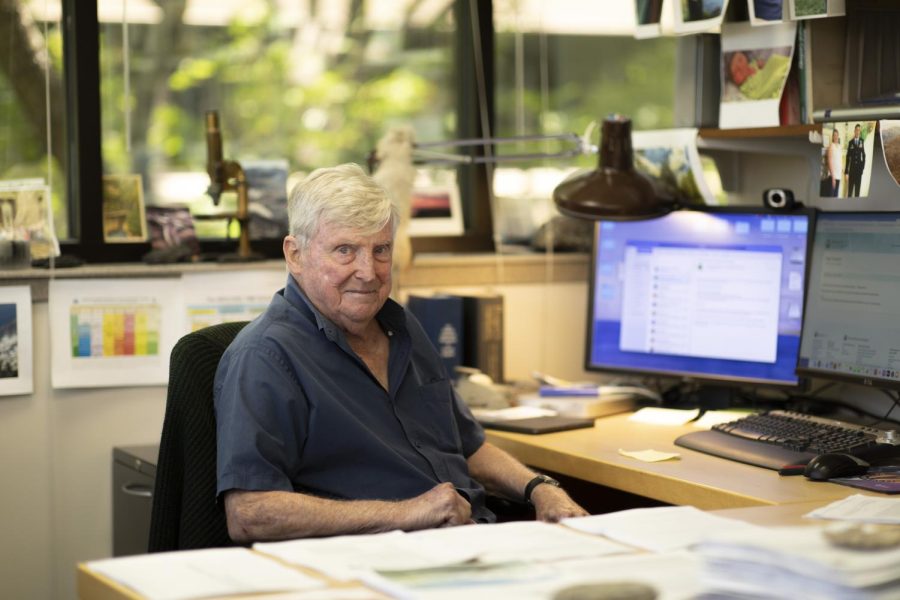UT professor Ian Dalziel recognized for contributions to understanding Antarctica with UK Polar Medal
Professor Ian Dalziel sits in his office at the Pickle Research Center in Austin, Texas on June 29, 2023. Daziel was recently awarded the Polar Medal, the top prize in the UK, for his research in Antarctica.
July 2, 2023
“I guess you could say he’s almost like a Renaissance geologist.”
This is how Sharon Mosher, professor and dean emeritus of the Jackson School of Geosciences, described her long-time colleague and friend Ian Dalziel. Dalziel, a professor of geological sciences, is one of few selected for this year’s Polar Medal due to his trailblazing exploration and discoveries in Antarctica. He will be awarded the medal by King Charles III later this year.
The medal was first created in September 1904 to reward Captain Robert F. Scott for conducting the first successful voyage to Antarctica. The medal is now used by the U.K. and Commonwealth governments to reward scientists with significant contributions to our understanding of the polar regions throughout their lifetime of work.
Dalziel is responsible for some of the most important findings that changed our global understanding of Antarctica’s geological history. According to a University press release, he helped establish a widely used logistical system that extended the reach of remote Antarctic research bases, which then brought confirming evidence that West Antarctica is made up of broken pieces of the supercontinent Gondwana; established the first GPS receiver network used globally that showed Antarctica’s ice sheet is melting away causing the continent to rise; and he discovered that the remote Antarctic island of South Georgia is a lost fragment of the southern Andes in South America.
“He knows a lot of geology, he’s seen a lot of things, but unlike a lot of people, he thinks on a global scale,” Mosher said. “I think the thing that’s very unusual about him is that some of his ideas caused research by hundreds of people over decades because of the original idea he had.”
Colleagues who have worked in the field with Dalziel referred to him as a visionary known for his bold ideas. Mark Helper, a distinguished senior lecturer in the Department of Geological Sciences, did remote work in Antarctica with Dalziel from 1993-94 and again from 1996-97 and said he was grateful for all he learned working alongside him.
“There just aren’t many like him (and) his science is equally exceptional. He’s a tremendously imaginative thinker, not afraid to publish untested big ideas that he and others can test and expand upon to move our science forward,” Helper said in an email. “I have no other colleagues so richly deserving of recognition and distinction.”
Dalziel, himself a Scotland native, said spending a lot of time in the “wild places” on the west coast of Scotland growing up made him want to become a geologist. He said he always had a strong interest in Antarctica, and when he started his research in America at the University of Wisconsin-Madison, he discovered the possibilities of working there.
“When I was a student in the 1950s, people were still debating whether continental drift had happened or not, whether it was a reality,” Dalziel said. “Antarctica, therefore, intrigued me as part of the potential jigsaw of continents that must have fallen part of the supercontinent Pangea.”
Although Dalziel grew up in Scotland, he spent most of his career working for the United States Antarctic Program, even leading joint expeditions with the British Antarctic Survey. He said being recognized by Britain with such a prestigious award while working for another national program is very rare and therefore makes it all the more gratifying.
“From a Texas point of view, the Institute for Geophysics in the Jackson School of Geosciences has been a wonderful base from which to go and explore,” Dalziel said. “It’s been a fantastic opportunity afforded by the University of Texas and its Institute for Geophysics to give the time and the freedom to be able to pursue wide-ranging research like that.”



